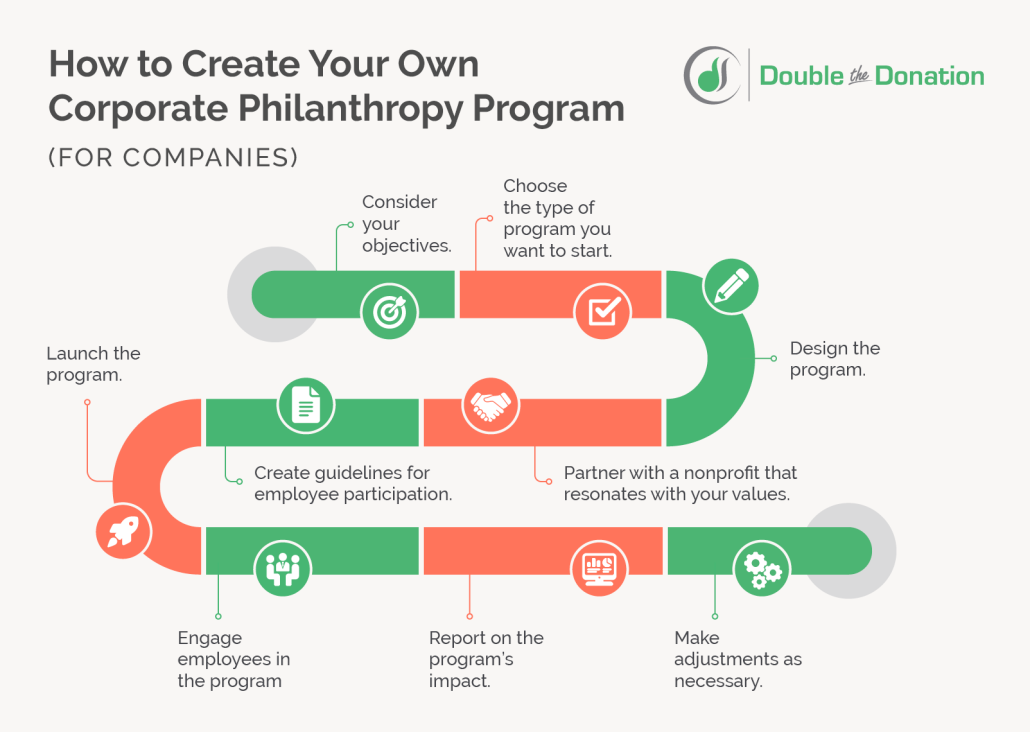Why Company Philanthropy Matters: An Overview to Corporate Social Obligation
Company philanthropy works as a necessary element of company social obligation. It shows a company's dedication to social issues and improves its public photo. Businesses participating in kind efforts typically see enhanced employee morale and more powerful area connections. However, the true influence of these campaigns can be diverse and intricate. Recognizing the subtleties of company philanthropy can illuminate its relevance in today's business landscape. What are the crucial aspects that drive its success?
The Meaning of Company Philanthropy
Business philanthropy describes the philanthropic contributions and efforts embarked on by services to support social causes and neighborhood advancement. This idea includes a range of activities, including financial contributions, staff member volunteer programs, and in-kind presents of services or products. Companies engage in philanthropy to resolve social concerns such as education, healthcare, environmental sustainability, and poverty reduction.
Typically, corporate philanthropy is structured with official programs or collaborations with not-for-profit organizations, allowing businesses to utilize their sources successfully. These efforts typically aim to make a favorable influence on the neighborhood while aligning with the company's worths and objective. Additionally, company philanthropy shows a commitment to company social obligation, showcasing how organizations can add to culture past profit generation. By taking part in humanitarian efforts, business can play a significant duty in promoting social change and addressing neighborhood needs.
Advantages of Corporate Philanthropy for Organizations
Engaging in company philanthropy offers countless advantages for organizations, improving their reputation and cultivating stronger neighborhood connections. Firms that proactively join humanitarian initiatives commonly experience enhanced staff member morale and loyalty. When staff members view their company as socially accountable, they are more likely to really feel happy with their office, leading to higher levels of work complete satisfaction and retention.
In addition, corporate philanthropy can produce beneficial networking opportunities. Working together with non-profits and area organizations allows services to get in touch with similar individuals and groups, potentially causing collaborations that can benefit both parties. Additionally, services involved in philanthropy may find themselves a lot more attractive to stakeholders and capitalists that focus on moral practices.
Ultimately, corporate philanthropy not only supports societal needs but also provides tangible benefits to businesses, creating a win-win circumstance that advertises development and sustainability while adding favorably to the globe.
Enhancing Brand Loyalty Through Social Responsibility
Enhancing brand loyalty via social duty entails structure depend on with consumers by aligning business actions with area values (corporate philanthropy). Companies can promote deeper connections through community involvement campaigns that reverberate with their target audience. Furthermore, authentic brand name narration can additionally strengthen loyalty by showcasing genuine dedication to social reasons
Building Trust Via Activity
Building trust through activity is a powerful technique that companies can implement to strengthen brand loyalty and foster much deeper links with customers. When businesses proactively engage in corporate philanthropy, they demonstrate a dedication to ethical techniques and social duty. This positive technique not just improves their online reputation yet also resonates with customers who focus on values positioning. Transparency in kind efforts is essential; business must properly communicate their campaigns and the influence they are making. Credibility plays a substantial function as well; consumers are most likely to support brands that truly respect social problems as opposed to those that engage in shallow marketing. Inevitably, by prioritizing significant activities over mere words, business can support enduring depend on and commitment among their client base.
Area Engagement Efforts

Authentic Brand Name Storytelling
Area involvement campaigns typically work as a foundation for authentic brand storytelling, which plays a considerable function in cultivating brand loyalty. By sharing genuine narratives about their social responsibility efforts, companies can connect emotionally with customers. These tales highlight the brand name's worths, mission, and dedication to social renovation, cultivating depend on and relatability. They are more most likely to create a much deeper affinity and preference for it when consumers view a brand as socially responsible - corporate philanthropy. Authentic narration additionally motivates transparency, welcoming customers to engage with the brand on an individual level. As a result, businesses not just improve their online reputation however also construct enduring connections with their audience, inevitably causing enhanced commitment and advocacy in a competitive market
The Duty of Workers in Corporate Philanthropy
Staff members play a necessary function in forming a business's philanthropic initiatives through their involvement and participation. Reliable worker involvement methods can enhance volunteerism, resulting in meaningful neighborhood impact. As companies harness the cumulative energy and interest of their labor force, they can promote a culture of considering that expands past the office.
Staff Member Engagement Methods
Involvement in business philanthropy promotes a feeling of function that extends beyond plain profit-making. Companies can improve staff member participation by implementing various methods that urge participation in humanitarian efforts. One effective method is to develop a coordinating present program, where the business matches employee contributions to qualified charities, enhancing their impact. Furthermore, normal interaction regarding humanitarian initiatives can create awareness and inspire staff members to add their time and sources. In addition, supplying systems for employees to share their philanthropic interests cultivates a feeling of ownership and community. Recognizing and rewarding workers for their philanthropic contributions can likewise strengthen a society of offering, ultimately resulting in an extra involved workforce straightened with the company's social obligation goals.
Volunteerism and Neighborhood Impact
Company philanthropy grows when people proactively participate in volunteerism, directly influencing the communities they offer. Staff member participation see this page in volunteer campaigns not only improves company society however likewise promotes a feeling of function and link amongst team. Via volunteering, workers develop necessary abilities, such as team effort and leadership, which can translate right into enhanced job efficiency. Furthermore, when employees join for area triggers, they strengthen their bond with the company, improving overall spirits and loyalty. Organizations that urge volunteerism usually see a favorable public image, as area interaction reflects their dedication to social responsibility. Inevitably, the collective influence of worker volunteer efforts can change communities, resolving pressing social concerns while strengthening company values and goal.

Measuring the Influence of CSR Initiatives
As companies progressively purchase company social obligation (CSR) efforts, understanding their influence ends up being important for evaluating performance and assisting future efforts. Gauging the impact of CSR calls for a diverse approach, integrating both qualitative and quantitative metrics. Secret performance indications (KPIs) such as community involvement levels, staff member complete satisfaction, and ecological renovations offer important understandings right into the end results of CSR programs. Surveys and interviews with stakeholders can disclose the social modification created by these initiatives, while data analysis assists track progress versus established purposes.
Aligning CSR objectives with business purposes boosts accountability. Organizations can make use of structures such as the International Reporting Effort or the UN Sustainable Development Goals to systematize their dimension procedures. Ultimately, accurate evaluation of CSR initiatives not only demonstrates a business's commitment to social duty yet additionally educates strategy adjustments to make the most of favorable influence, promoting a culture of sustainability and neighborhood interaction.
Ideal Practices for Implementing Reliable CSR Techniques
Carrying out effective CSR approaches calls for a clear understanding of a company's goals and worths, assuring positioning with stakeholder expectations. Effective business start by conducting a detailed assessment of their social, ecological, and economic influences, enabling them to identify locations for enhancement. Stakeholder engagement is important; companies should check this proactively entail staff members, consumers, and community members in the development and execution of CSR campaigns.
Transparency is an additional best technique, as it promotes trust and liability. Business must communicate their CSR purposes and progress openly, sharing both successes and obstacles. In addition, integrating CSR into the core organization strategy improves its influence, making it a fundamental part of operations as opposed to a second thought. Normal evaluation and adjustment of CSR initiatives, notified by stakeholder comments and changing societal demands, warranty significance and efficacy. By adhering to these methods, organizations can develop purposeful and lasting CSR strategies that reverberate with their neighborhoods.
Regularly Asked Inquiries
Just How Can Local Business Get Involved in Business Philanthropy?
Local business can participate in business philanthropy by contributing a percent of earnings, sponsoring regional events, partnering with nonprofits, supplying staff member volunteer days, and taking part in social work tasks, promoting a positive influence and improving their brand track record.
What Are Usual Misconceptions About Business Philanthropy?
Common false impressions regarding business philanthropy include the idea that it's only a marketing device, company website that just huge business can get involved, which it lacks real impact. Numerous take too lightly the value local business can add through meaningful engagement.
Exactly How Do Consumers Perceive Firms Involved in Philanthropy?
Customers commonly view business participated in philanthropy positively, linking such efforts with business responsibility, moral behavior, and neighborhood support. This perception can improve brand commitment, impact purchasing choices, and enhance general company online reputation in the market.
Are There Tax Benefits for Companies Associated With Philanthropy?
Organizations involved in philanthropy typically delight in different tax obligation advantages, such as deductions for charitable payments. corporate philanthropy. These rewards can enhance a firm's economic standing while advertising a favorable public picture through their area engagement initiatives
Can Corporate Philanthropy Improve Worker Retention Rates?
Business philanthropy can enhance employee retention prices by promoting a sense of objective and belonging amongst team. Engaged employees, aligned with company worths, are most likely to remain pleased and committed within their duties.
Corporate philanthropy serves as a crucial part of company social duty. Company philanthropy refers to the philanthropic contributions and campaigns embarked on by companies to support social reasons and neighborhood growth. Furthermore, corporate philanthropy reflects a dedication to corporate social responsibility, showcasing exactly how companies can add to society beyond profit generation. Involving in company philanthropy deals countless advantages for organizations, improving their credibility and cultivating more powerful neighborhood connections. Consumers usually view business involved in philanthropy positively, linking such efforts with corporate responsibility, ethical actions, and community support.